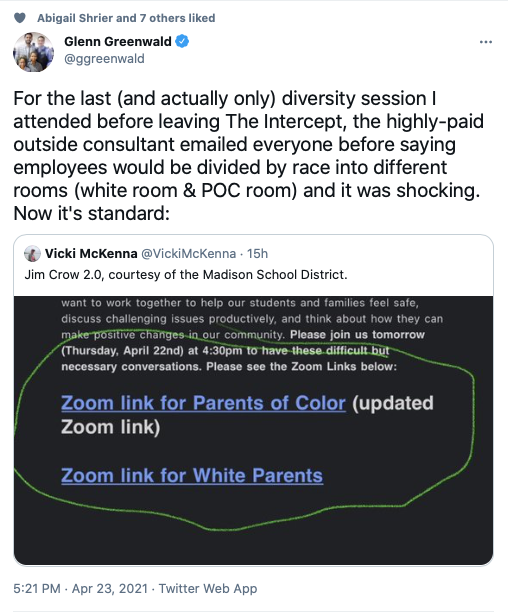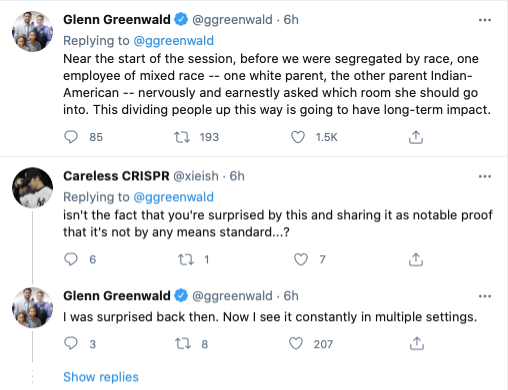Glenn Greenwald Puts Spotlight on CNN’s Natasha Bertrand to Illustrate the DNC – Spy State Alliance
It wasn't that long ago that Democrats were suspicious (if not hostile) to the CIA and America's other spy agencies. There was good reason for that, given the long history of propaganda, lies and manipulation by the CIA, FBI and NSA. Perhaps the peak of this DNC anti-spy state feeling occurred during Edward Snowden's revelations.
But then something happened. The Spy State became useful to the DNC, driven by their mutual hostility to Donald Trump. This was brought on by Trump himself by his ridicule of the spies. This makes for terrible political strategy, as highlighted in this short interview from 2017, Rachel Maddow interviewing Chuck Schumer: "When you take on the intelligence community, they have six ways from Sunday of getting back at you." The CIA and NSA have immense resources for getting back at you by fueling campaigns of disinformation:
We know remarkably little about the nature of the nation’s intelligence spending, other than its supposed total, released in a report every year. By now, it’s more than $80 billion.During the good old days of 2013, some Democrats took seriously the revelations disclosed by Edward Snowden, even though they were hesitant to applaud his efforts publicly. This headline tells you what the DNC thinks about Snowden's heroic actions: "Almost No Democrats Are Calling On Trump To Pardon Edward Snowden: Many progressive lawmakers have pushed reforms based on Snowden’s leaks, which makes their silence about a potential pardon that much more curious." This is a complex multi-variate issue, of course, but I suspect that Snowden has been abandoned to twist in the wind because he is not useful to the DNC and because Snowden is not a friend of the DNC's newish friend, the U.S. spy state.
This brings us to Glenn Greenwald's most recent article about the bubbly friendship involving the spy state, the DNC and the DND-allied "news" media. Corruption doesn't happen in the abstract. Rather, it is furthered by the conduct of real-life human beings, often by people who willingly betray the principles that should be guiding them in exchange for money and career advancement. CNN's Natasha Bertrand is one for those people. Greenwald's article is titled: "CNN's New "Reporter," Natasha Bertrand, is a Deranged Conspiracy Theorist and Scandal-Plagued CIA Propagandist: In the U.S. corporate media, the surest way to advance is to loyally spread lies and deceit from the U.S. security state. Bertrand is just the latest example."
Glenn Greenwald continues to be a lightning rod for abuse from many political directions. These ad hominem attacks stem from his reporting because he has a problem: he follows facts where they lead, regardless of who this pisses off. His resulting and undeservedly untarnished reputation makes many people (including many of my FB "Friends") viscerally hostile to Greenwald and hesitant to read or believe what he has written. Here is the solution to that (unwarranted) hostility: Greenwald's article contains numerous links allowing you to read the underlying evidence and weep. Here is an excerpt, but I urge you to read the full article, to follow Glenn Greenwald at his Substack account and, further, to financially support his courageous journalism.
Natasha Bertrand has spent the last five years working as a spokesperson for the alliance composed of the CIA and the Democratic Party, spreading every unvetted and unproven conspiracy theory about Russiagate that they fed her. The more loyally she performed that propagandistic function, the more rapidly she was promoted and rewarded. Now she arrives at her latest destination: CNN, not only Russiagate Central along with MSNBC but also the home to countless ex-operatives of the security state agencies on whose behalf Bertrand speaks.
Once again we see the two key truths of modern corporate journalism in the U.S. First, we have the Jeffrey Goldberg Principle: you can never go wrong, but only right, by disseminating lies and propaganda from the CIA. Second, the organs that spread the most disinformation and crave disinformation agents as their employees are the very same ones who demand censorship of the internet in the name of stopping disinformation.
I've long said that if you want to understand how to thrive in this part of the media world, you should study the career advancement of Jeffrey Goldberg, propelled by one reckless act after the next. But now the sequel to the Goldberg Rise is the thriving career of this new CNN reporter whose value as a CIA propagandist Goldberg, notably, was the first to spot and reward.



